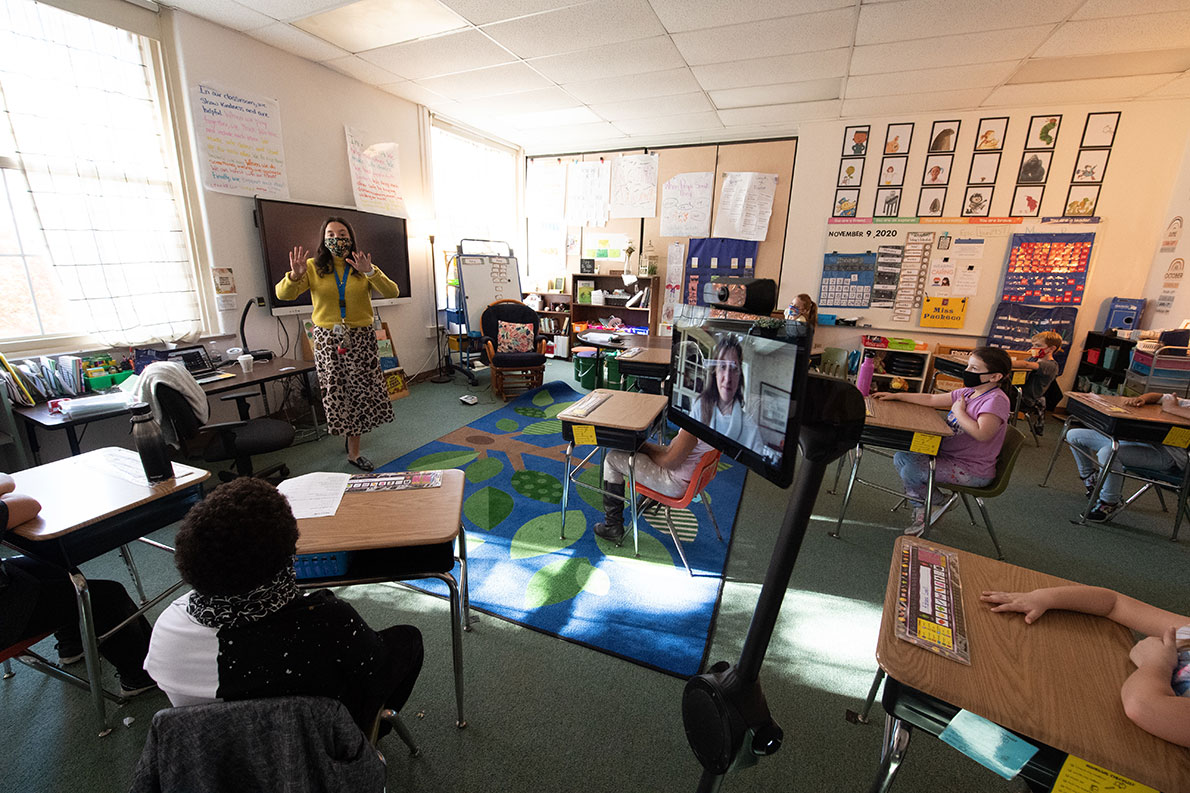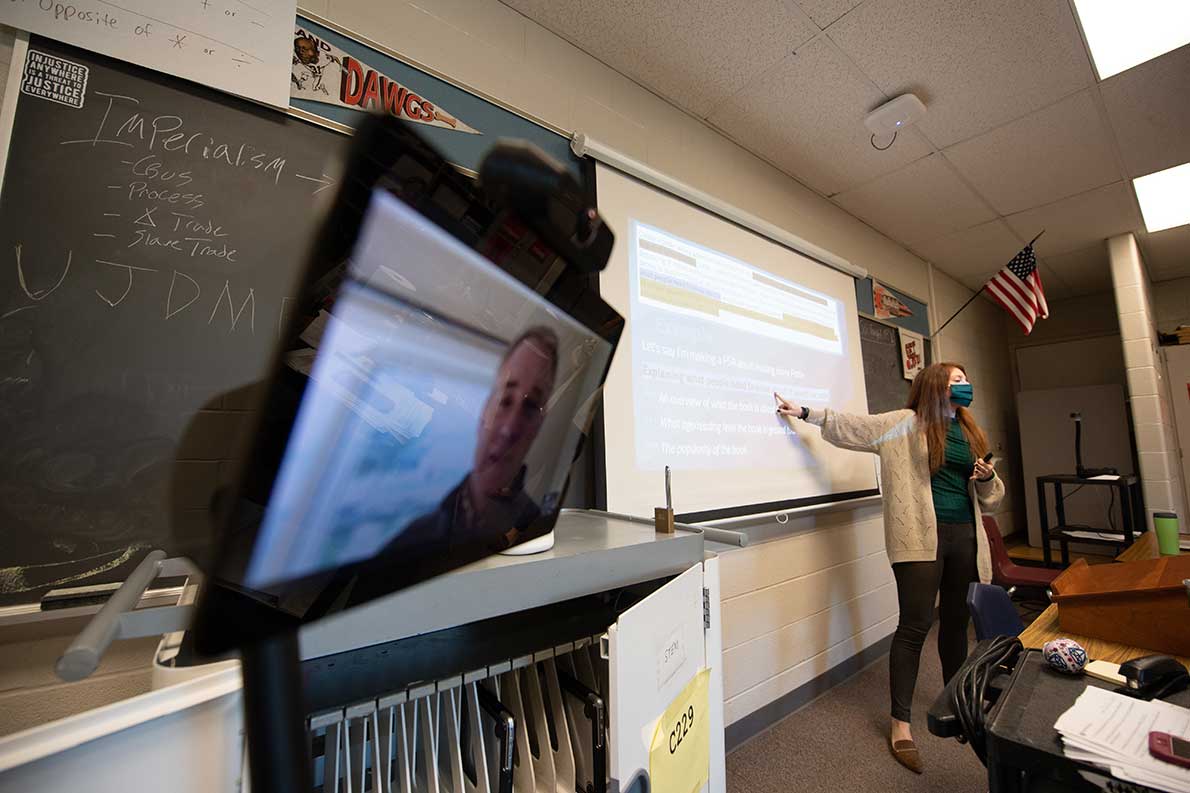
Wooster’s education department uses Ohmni Robots in place of in-person field experience amid pandemic restrictions

During a typical semester, The College of Wooster Department of Education places students in Wooster City School classrooms to observe professional teachers at work. Due to the coronavirus pandemic this year, the department decided it wouldn’t be safe to have in-person field placements. Instead, by rotating three robots that record a live video through six different elementary, middle, and high school classrooms, Wooster students are still receiving invaluable classroom experience. Navigated remotely by Wooster professors, the robots, called Ohmni Robots, allow college students to virtually observe a teacher working in real time.
Two of the teachers hosting the robots are Wooster alumni, who know firsthand the importance of field placement experience. “Wooster’s education program stands a noticeable cut above others in the state, particularly in their work in the field,” said Chelsey Porter ’14, an English teacher at Wooster High School. “Because the pandemic has eliminated much of the in-person field experience from classes this semester, I wanted to contribute to a virtual field experience for the students so that the valuable time spent in classrooms is not lost.”

Chelsey Porter ’14 gives Wooster education students a look inside her English class at Wooster High School.
While education students can watch recorded videos of classrooms, the live element the robots provide makes the experience more similar to a field placement. “The robots give the College friends a better glimpse of what a classroom looks and feels like and is in real time,” said Lexi Pacheco ’18, a second grade teacher at Cornerstone Elementary School.
Through observing remotely, education students discuss what they notice with their classmates and professors and ask questions in the virtual chat, something which isn’t possible in typical field placements, when everyone is in different classrooms off campus. “My students will make comments in the chat that can guide later discussions which is really interesting,” explained Allison Neptune, assistant professor of education. “If we were all in the classroom, we couldn’t just start having a conversation while the teacher is teaching.”
Not only do the robots benefit the college students, but they are also exciting for the Wooster City School students. “They can show what they’re doing, take ownership for things, and be proud of their classroom,” said Gretchen Tefs, an instructor in education at the College. In Pacheco’s class, a second grade student was thrilled to be able to read a book to an entire college class watching through the robot. These kinds of opportunities bring positivity to the city school students who are also dealing with a disrupted school year. “Having the robots in my classroom shows my students that although the world feels upside down right now, the work they are doing and how they are adapting to these circumstances is impressive and important,” Porter said. “The college students have been able to ask my students questions about their work, which helps them feel seen and heard.”
The robots also allow the mentor relationships that form between the professional and aspiring teachers to continue, a crucial part of the field placement experience. “It benefits our partner teachers because the ones who have been teaching for a while see their role as passing on this profession to other people,” said Ryan Ozar, assistant professor of education. “A significant part of their identities is to mentor people so here they get to mentor our students.”
Pacheco and Porter are excited to host the robots in their classrooms because it gives them a chance to give back to an education program that they learned so much from. “When the education department approached me about this opportunity, I didn’t think twice about it. I am so excited and honored to help support in any way,” said Pacheco. “I feel a big sense of pride having graduated from the College. The Department of Education played an indispensable role in my success there and now in my life after.”
Porter enjoys being able to work with her former professors again through this partnership. “I love working with the College of Wooster education department not only because I get to foster relationships with professors I had, but also because I feel so strongly about the program and am thrilled to be able to give back,” she said.
While the department plans to resume the in-person field placements when it is safe to do so, they hope to continue to use the robots to provide insight into classrooms that the college students may otherwise not typically see. “Our first choice is to physically be in the classroom, but the robots open up some opportunities in the future for us,” said Sarah Dunlap, the director of field, assessment, and candidate engagement for the Department of Education. “We could see some different classrooms than what we would be able to see in a typical year when we’re just putting students out into the county. The possibilities are endless.”
In the meantime, the robots give the College’s aspiring teachers insight into not only how to teach, but how to teach in the midst of extremely challenging circumstances. “The use of these robots allows education students to see one of the most critical skills necessary to be a good teacher: the ability to adapt,” Porter said. “Our commitment to continuing to find a way to learn and grow, especially in such a time, really demonstrates the passion it takes to be in education. The idea that ‘it takes a village’ could never be more true, but our village is full of very talented and passionate people making this work!”
Above: Lexi Pacheco ’18 hosts Wooster’s OmniRobot in her second grade classroom at Cornerstone Elementary School.
Posted in News on November 13, 2020.
Related Posts
Related Areas of Study
Education
Graduate as a licensed teacher in pre-K-12 in fields ranging from science to music education
Major Minor Teaching Licensure

